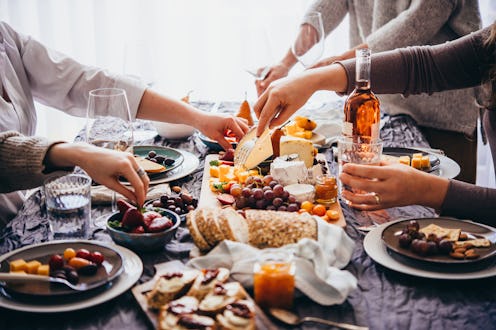Life
The Psychological Reason People Are Jerks To Vegans

As someone with celiac disease and a slew of necessary dietary restrictions, I can tell you that navigating the world of normative eating can be challenging, to say the least. Food choices are intricately linked to tradition, comfort, and pleasure, and people tend to get all in their feelings when it comes to food. If you’re someone who follows a specific food plan for health or ethical reasons — or even if you just really don’t like cheese, for example — you probably know the shock and awe that can come your way when people find out that, somehow, you are managing to stay alive without mozzarella. Even if going through life without cheese, or nuts, or animal products, or gluten seems incomprehensible for some folks, it doesn’t explain exactly why people don't respect your dietary needs or wants.
“Just like there are varied reasons why people make personal food choices, there are wide-ranging reasons someone may question, push back, or even judge others’ dietary choices,” Erica Curtis, LMFT, a board certified marriage and family therapist and author of The Innovative Parent: Raising Connected, Happy, Successful Kids Through Art tells Bustle by email. Another person's lack of understanding as to why your choices are important to you can contribute to the pushback, Curtis says, while their unfounded fear of being judged by you may also be a factor. Moreover, feelings of rejection can play a part in this dynamic, says Curtis. “A rejection of an offering of food may feel like a rejection of the person offering the food. A person may also fear, consciously or unconsciously, that you are quietly judging their food choices for not being as healthy, value-driven, or as thoughtful as you.”
So, if you mention at Thanksgiving that yes, Grandma, you're still vegan, your uncle might interpret that to mean you're judging him for his choice to eat meat — when all your being vegan means is that you eat plants, not that you're judging anyone.
But what if you’re pretty clear that you’re just doing your own thing when it comes to family dinner? If you don't judge other people for their food choices, but still get other people's 'tude, you might wonder how you can coexist peacefully with friends and family who aren't exactly being very understanding. If your housemate or partner doesn’t fully "get" why you eat the way you do, there are ways to deal with that, Curtis says.
“Having an open-hearted dialogue is a good place to start in laying the groundwork for needs and expectations when it comes to food shopping, preparation, and storage for differing dietary choices,” says Curtis. “Get clear about your needs, including what’s non-negotiable and where there’s room for flexibility. Ask the same of those you live with. Even if the non-negotiables seem completely gridlocked, once you move into the realm of ‘room for flexibility’, people start to think more creatively about solutions.”
For instance, if you're vegan, maybe not having meat in the fridge is non-negotiable for you, but, in order to offer some flexibility to your partner or roomie, you feel OK if it’s stored in containers you can’t see through while keeping cooking pans for animal products and veggies separate. Additionally, making requests instead of demands can go a long way towards promoting happiness in your kitchen, Curtis says. “Asking ‘Would you be willing to’ or ‘Would you be open to’ will garner a more positive response than demanding absolutes, such as ‘You don’t get to decide’,” she says. If you have food allergies or intolerances, you may not have this kind of flexibility, so make sure that the people you live with understand your needs before you move in together.
If you’re getting static at the dinner table and you decide to discuss your dietary choices, it can help to get curious about the other person’s point of view, Beverly Cathcart-Ross told Allergic Living. Upholding your own needs while approaching the conversation mindfully creates 'dual respect', Cathcart-Ross says.
“Often, allowing the other person to feel heard will increase his or her ability to hear you out in return,” Curtis notes. Create open, curiosity-driven dialogue with statements like: ‘I’m curious to learn more about your thoughts on this.’ ‘Is there a story behind your position?’ ‘Does this relate to a value or your background?’ Once the other person feels heard, test the waters to see if he is open to hearing your position on the matter now,” Curtis says. Avoid arguing against, judging, or trying to persuade the other person. This can help prevent defensive reactions on both sides, she says.
No matter what the reasons are, you’re entitled to eat however you need or want to. And while some people in your life might never fully understand your choices, you really don’t owe anyone else an explanation. If you do decide to talk about why you eat the way you do, keep the dialogue low key and non-judgmental. “Simply tell the story of your position, and how it’s come to be important to you — not to convince someone else, but to be more deeply known and understood by the people who matter to you,” Curtis says.
Experts:
Erica Curtis, LMFT, author of The Innovative Parent: Raising Connected, Happy, Successful Kids Through Art